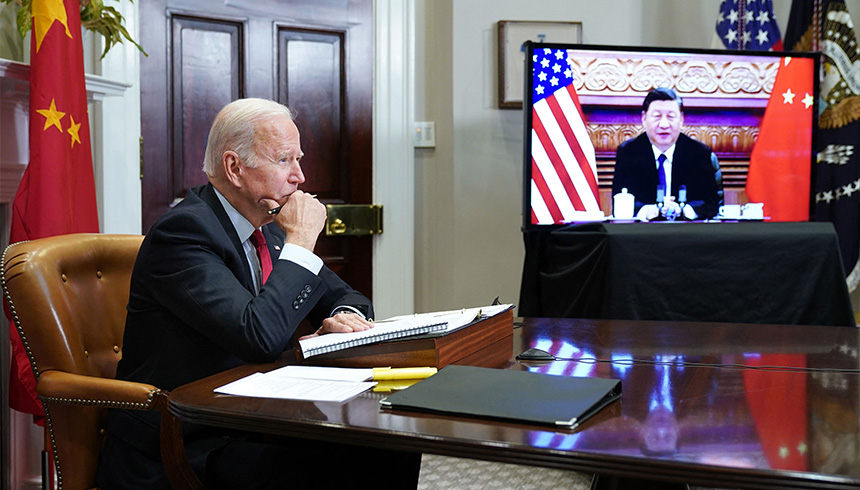US-Asia Market Watch
US-China Market Watch: End of Trade Deal, China Curbs Foreign IPO, World’s Largest Box Office
By

Your monthly roundup of the latest US-China business and industry news.
China falls short on U.S. trade deal
The "phase one" U.S.-China trade deal, signed under President Trump in January 2020, has expired, with China falling short of purchase commitments. According to the Peterson Institute for International Economics, China will have fulfilled only about 60% of the additional $200 billion in U.S. goods it had agreed to purchase through 2021. Although the trade deal had initially increased U.S. exports to China, the global COVID-19 pandemic reversed that trend, leading to a surge in imports from the mainland. Critics of the deal have also said that it's unsurprising that China failed to meet such ambitious targets.
Under the trade deal, China agreed to purchase more U.S. agriculture, manufactured products such as airplanes and cars, and energy. China has fulfilled 83% of its agricultural commitments, 60% of its manufactured goods commitments, and 37% of its energy commitments.
Both President Biden and U.S. Trade Representative Katherine Tai have stressed during meetings with President Xi Jinping and Vice Premier Liu He, respectively, that China meet these trade commitments, but that those agreements comprised only one part of the trade deal. However, there was no mention of trade after Biden and Xi's last meeting, and it is unclear how the Biden administration will proceed.
China imposes restrictions on foreign IPOs in certain sectors
In the wake of Chinese rideshare giant Didi Global's planned New York Stock Exchange delisting, Chinese regulators have released new regulations aimed at tightening scrutiny on overseas stock listings.
According to China's National Development and Reform Commission and the Ministry of Commerce, Chinese firms in industries banned from foreign investment must obtain a waiver from a negative list. Foreign investors also cannot own more than 30% of a company, with a single investor capped at 10%, and are not allowed to participate in management of the company.
The China Securities Regulatory Committee has also proposed that any Chinese firm seeking initial public offerings and additional share sales abroad will need to register with the securities regulator. Any firm's listing that is deemed a national security concern will be unable to proceed.
China the world's largest box office for second year in a row
Thanks to its pandemic response and economic recovery, China will once again retain the title as the world's largest box office, beating out North America for the second year running. China currently has grossed about $7 billion at the box office, making up 39% of the global box office for 2021. The United States is in second place with $3.7 billion, or about 21% of the global share. However, analytics firm Gower Street predicts that North America's share of box office revenue will more than double in 2022, propelling it back to the number one position.
The year 2021 was a testy one for Hollywood in China, with numerous tentpoles such as Marvel's "Shang-Chi" and Warner Brothers' "Space Jam" never receiving release dates in the mainland. According to The Hollywood Reporter, just 25 U.S. films were released in China, with smaller indie titles making up the majority of them (in contrast, China showed bout 45 Hollywood films in 2019). Given the increasing bilateral tensions, 2022 could test relations even further.
Nio debuts new sedan and AR glasses
Chinese electric car company Nio introduced its new sedan, the ET5, and augmented reality (AR) glasses that aim to reduce drivers' needs for looking down at car screens, potentially making it safer for people on the road.
Nio partnered with Chinese AR startup Nreal to create the glasses for the ET5, which is Nio's second sedan to come on the market and will begin deliveries in September 2022. The company's first sedan, the ET7, was revealed in January 2021 and is set to begin deliveries on March 28, 2022.
Waymo teams up with Geely to make autonomous cars
Waymo, Alphabet's autonomous driving branch, is working with Zeekr, an electric car brand under China's Geely, to build a fleet of self-driving ridesharing vehicles. The cars will be based off of Zeekr's minivan, which has received praise for the concept designs that were created specifically for ridesharing.
Under the partnership, Waymo will fit the vehicles with the hardware and software necessary for autonomous driving. The cars will be designed in Sweden, where Geely owns Swedish carmaker Volvo.

